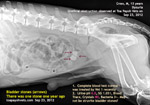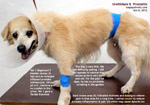The dog was a Golden Retriever X, medium sized, 13 years old and lethargic. A high anaesthetic risk. So I did not advise surgery. Catherised urethra 2 days. Today, he could pee normally but vomited canned food.
The dog could pee normally and had a good appetite
today. So I did not operate as he is very old and
thin. Will S/D diet help? But his urinary pH is 6.0
and not alkaline. The urine crystals are nil and so
the only way to know what composition of the urinary
stones in his bladder would be to do surgery. But
the dog may die on the operating table since he is
13 years old. So, this is the difficulty. The dog
was given K/D diet by Vet 1 before I was handling
the case. Could K/D bring down the urinary pH to
below 7.0?
A trial of S/D may not be effective since the
composition of the urinary stone is not known. It
may be calcium oxalate but it may also be struvite.
S/D diet dissolves struvite stones. The dog had
antibiotics and a can of S/D diet with informed
consent from the owner. For the past 2 days, he was
urinating normally and had excellent appetite. I
dare not do any cystotomy surgery as the risks
outweigh the benefits. An S/D trial is one
alternative and it may be worth a trial. It is not
evidence-based, I informed the young lady owner. She
understood.



 Toa
Payoh Vets
Toa
Payoh Vets